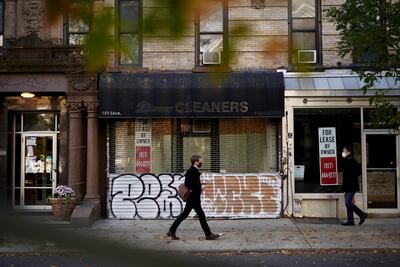This will be the strangest Thanksgiving holiday on record in America, aside from 1918 when America battled the H1N1 virus known as the Spanish flu.
Then, it was the end of a brutal World War. Now, we have a sulking lame duck president hiding out in the White House. But like 1918, there are millions dead worldwide, families separated, a devastated economy and a depressed society.
There’s not much in 2020 to give thanks. How can you eat and drink epic amounts – which is what the holiday is really about – while wearing a mask indoors, which Dr. Anthony Fauci, the National Institute of Allergy and Infectious Disease Director, has advised us?
This is what Thanksgiving means to most Americans: huge turkeys, heaving tables; the Macy’s Thanksgiving parade down 34th Street; football games; overcrowded airports; cross country trips; bickering families; grandparents and new babies.
It might be a Normal Rockwell fantasy. Americans are bribed into being happy during the holidays. It’s as much a part of the culture as fireworks and barbecues on the Fourth of July. From the time we are in kindergarten, we are taught to draw pilgrims feasting on roast pumpkin and turkey alongside the Wampanoag people, everyone happy.
But it’s a lie. No one ever told us about the blankets the Europeans traded the Native Americans, loaded with smallpox causing the Great Epidemic; or how the Europeans then stole their land and forced them into subjugation. Needless to say, Native Americans celebrate a National Day of Mourning instead of Thanksgiving.
Thanksgiving didn’t become an official holiday until the Civil War, in 1863. It traditionally kicks off the official holiday season – only one more shopping month until Christmas.
Black Friday, the day after, is the day when in normal times, i.e., non-Covid, everyone went mad shopping. When you bought things you could not afford: a car, a coat, a diamond ring. Overspending, overeating: the American way.
But not this year. This is what 2020 looks like: Facetime dinner conversations. Cooking by Zoom with friends you cannot meet. Turkey dinners for two or three or even one. Masks and outdoor gatherings. Small businesses closed down. The bank account running dry because it’s been nine months without work for many people.
And most of all, instead of gratitude, we have fear. We’re not giving thanks; we’re praying not to get ill. To keep financially afloat. To not feel so isolated.
As an American who lived abroad my entire adult life, Thanksgiving in London, in Paris, in Baghdad, in Kabul – wherever I landed – was the highlight of my year. I loved it because it was an excuse to gather as many people as I could fit in a room and laugh and drink and eat.
In Kabul just after the fall of the Taliban in 2001, it was celebrated with a scrawny bird from Chicken Street, orange soda and contraband whiskey, sitting on the floor of my hotel room. In the West Bank shortly after the assassination of Yitzhak Rabin in 1995, it was falafel, hummus and pickles. In London, it was goose and champagne. In Paris home, where everyone was required to bring a dish, I’d squeeze dozens round a table for foie gras, turkey and macaroons from Ladurée.
This year it’s Mum and me and a long empty table. For an enormous Italian-American family used to feeding hoards, this is unheard of, almost sacrilegious. But it has to be a lonely holiday to keep us safe. My brothers, sisters, even my son are all staying away because they don’t want to get Mum sick.
I got Covid tested – the lines at Manhattan urgent care centers went around the block. But still, I’m haunted by all the messages out there: that dining with an elderly relative is like holding a gun at their head.
Neither of us are in the mood to bake pumpkin pie and make cranberry sauce. 2020 has drained us. She’s worried about getting the virus; I’m worn out from election drama and the death of my brother-in-law two weeks ago after catching Covid from a nursing home where he was recovering from a stroke. There’s no celebration.
My mother was born just after the Spanish flu pandemic ended and she lived through the Great Depression, but she fears Covid. The media, with their sensationalized maps of the dead across the country, don’t help to calm a terrified population. Instead of body counts of dead soldiers — like we had during the Vietnam War — we have daily death rates across the country.
Everyone I know is having some kind of scaled-down Thanksgiving lite. New York governor, Andrew Cuomo lectured us for weeks about staying home. “This year, if you love someone, it is better and safer to stay away”.
He’s hosting his 89-year old mother Mathilda. “But that might change,” he says.
Senior Trump administration officials sent starkly different messages about America’s pandemic Thanksgiving. The federal government’s top health official urged us to abide local coronavirus guidelines. But the the White House press secretary called those same directives as “Orwellian.”
“I think a lot of the guidelines you’re seeing are Orwellian,” Kayleigh McEnany said.
President Trump, who has been saying all along that the “China plague” would “magically disappear” will do the traditional pardoning a turkey, as longstanding presidential Thanksgiving tradition. The only thing that made me smile this week was the name of this year’s turkey candidates: Corn and Cob, who and will be retired to Iowa State University after the official pardon.
Trump – who should be praying for his own pardon — says he will stay in the White House instead of his usually glitzy fest down at Mar-al-Largo in a ballroom, alongside due-paying members who purchase tickets to attend.
Joe Biden is said to be having only three at his table.
As I write, I keep telling myself we will recover from this. I try to look for hopeful signs: the vaccines; the fact that President-elect Joe Biden has picked a stellar, grown up cabinet to help piece together our broken country.
We should also try to go back and see what happened in 1918. The Spanish influenza did end, after a third wave, in the summer of 1919. The country was also divided then by those who wore masks and stayed home and those who blatantly refused to obey the rules.
Officials in Los Angeles in November 1918 urged people to stay home over Thanksgiving, promoting a "stay at home week." The Los Angeles Times issued a call on its front page to "REMEMBER AFFLICTED THANKSGIVING DAY; Influenza Ban Is Felt."
But further north in San Francisco, the local newspaper, the Examiner, urged "'Flu' Masks To Be Ousted Thanksgiving."
This year, we’re resigned to a less cheerful holiday, but we are all hanging on hope. For science and the vaccines. For a new global order, led by Biden and officials like the new Secretary of State Anthony Blinken, who grew up in France and believes in global alliances. For a resilient society and economy. For a return to decency. Hopefully, we’ve been humbled by these dark days.
As for me, I am lightened by the fact that the Spanish flu was followed by the Jazz Age and the Roaring Twenties. One of the most creative, flourishing, and frankly entertaining periods in American history: a time of economic prosperity, creative edginess.
As we race towards the end of 2020, and I look down on my small Thanksgiving table, I’m also looking ahead to a time of growth, healing and rebuilding.
We can do it, America. We don’t have any choice.
Janine di Giovanni is a Senior Fellow at Yale’s Jackson Institute for Global Affairs.



